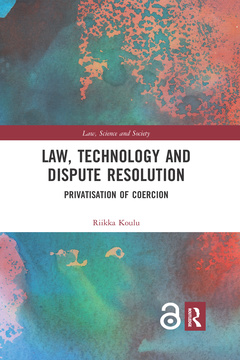Description
Law, Technology and Dispute Resolution
The Privatisation of Coercion
Law, Science and Society Series
Author: Koulu Riikka
Language: English
Subjects for Law, Technology and Dispute Resolution:
Keywords
Dispute Resolution Technology; Private Enforcement; Out-of Court Dispute Resolution; User Reviews; Private Enforcement Mechanisms; Due Process Criteria; Private Online Dispute Resolution; Structural Coupling; ODR Platform; ODR Provider; ODR Service; ODR Procedure; Traditional Ideal Model; Luhmann’s Social Systems Theory; Low Intensity Disputes; Dispute Resolution; Private Dispute Resolution; Smart Contracts; Justificatory Crisis; Justificatory Narratives; Private Autonomy; Courtroom Technology; Sovereignty Narrative; Lex Mercatoria; Critical Systems Theory
Publication date: 09-2020
· 15.6x23.4 cm · Paperback
Publication date: 10-2018
· 15.6x23.4 cm · Hardback
Description
/li>Contents
/li>Biography
/li>
The use of new information and communication technologies both inside the courts and in private online dispute resolution services is quickly changing everyday conflict management. However, the implications of the increasingly disruptive role of technology in dispute resolution remain largely undiscussed. In this book, assistant professor of law and digitalisation Riikka Koulu examines the multifaceted phenomenon of dispute resolution technology, focusing specifically on private enforcement, which modern technology enables on an unforeseen scale. The increase in private enforcement confounds legal structures and challenges the nation-state?s monopoly on violence. And, in this respect, the author argues that the technology-driven privatisation of enforcement ? from direct enforcement of e-commerce platforms to self-executing smart contracts in the blockchain ? brings the ethics of law?s coercive nature out into the open. This development constitutes a new, and dangerous, grey area of conflict management, which calls for transparency and public debate on the ethical implications of dispute resolution technology.
Table of contents
PART I
THEORETICAL IMPLICATIONS OF DISPUTE RESOLUTION TECHNOLOGY
Chapter 1 Introduction
Chapter 2 Understanding Law and Technology
Chapter 3 Emerging Crisis
PART II: THREE QUESTS FOR JUSTIFICATION: SOVEREIGNTY, CONTRACT AND ACCESS TO JUSTICE
Chapter 4 Heading towards Justification
Chapter 5 Sovereignty and State Agenda
Chapter 6 Consent and Private Autonomy
Chapter 7 Access to Justice
PART III: NEW WAYS FORWARD?
Chapter 8 New Bases for Justification
Chapter 9 Conclusions
Bibliography
Index
Dr. Riikka Koulu (LL.D. trained on the bench) is an assistant professor (tenure track) on law and digitalisation based in the University of Helsinki. She also leads the University of Helsinki Legal Tech Lab, an interdisciplinary law and technology hub at the Faculty of Law. Koulu's research interests include legal automation, distributed ledger technologies and legal analytics a well as algorithmic fairness and ethical implications of legal technology.




